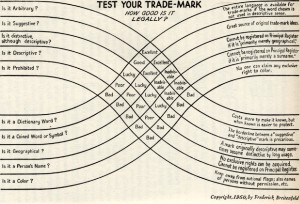The rules about trademark usage can get a little sticky, so for the purpose of this blog, we’re going to stick to the basics.
-
For starters, what exactly is a trademark?
- A trademark is generally a word, phrase, symbol, or design, or a combination thereof, that identifies and distinguishes the source of the goods of one party from those of others. A trademark protects brand names and logos used on goods and services.
-
What’s the difference between ™ and ®?
- Not much. They both mean the same thing but they’re used at different times. If you’ve just applied for your brand to be trademarked, use ™. If your brand has successfully been registered and approved by the United States Patent and Trademark Office (USPTO), use ®. You may only use the ® symbol while the registration is still active. After it expires, you may not use it.
-
What are the benefits of federal trademark registration?
- Public notice of your claim of ownership of the mark;
- A legal presumption of your ownership of the mark and your exclusive right to use the mark nationwide on or in connection with the goods/services listed in the registration;
- The ability to bring an action concerning the mark in federal court;
- The use of the U.S. registration as a basis to obtain registration in foreign countries;
- The ability to record the U.S. registration with the U.S. Customs and Border Protection (CBP) Service to prevent importation of infringing foreign goods;
- The right to use the federal registration symbol ®; and
- Listing in the United States Patent and Trademark Office’s online databases.
-
How long does it take for a brand to be registered?
- It can take anywhere from several months to several years, depending on the basis for filing and if there are any legal issues that arise during the process. To ensure it goes as quickly and smoothly as possible, be sure you review all documents carefully before submitting them. Check the status of your application every 3-4 months to see if any action is required on your part.
-
Do I need a trademark lawyer?
- You don’t need one, but we advise on using one. Why? Well for starters, they know all the rules. They do this frequently; therefore they can give valuable advice and help you avoid common mistakes.
-
What else do I need to know?
- Below you will find a few links that should answer all your questions regarding the trademark process!
- Trademark FAQs
- Basic Facts About Trademarks
- A Guide for Businesses

